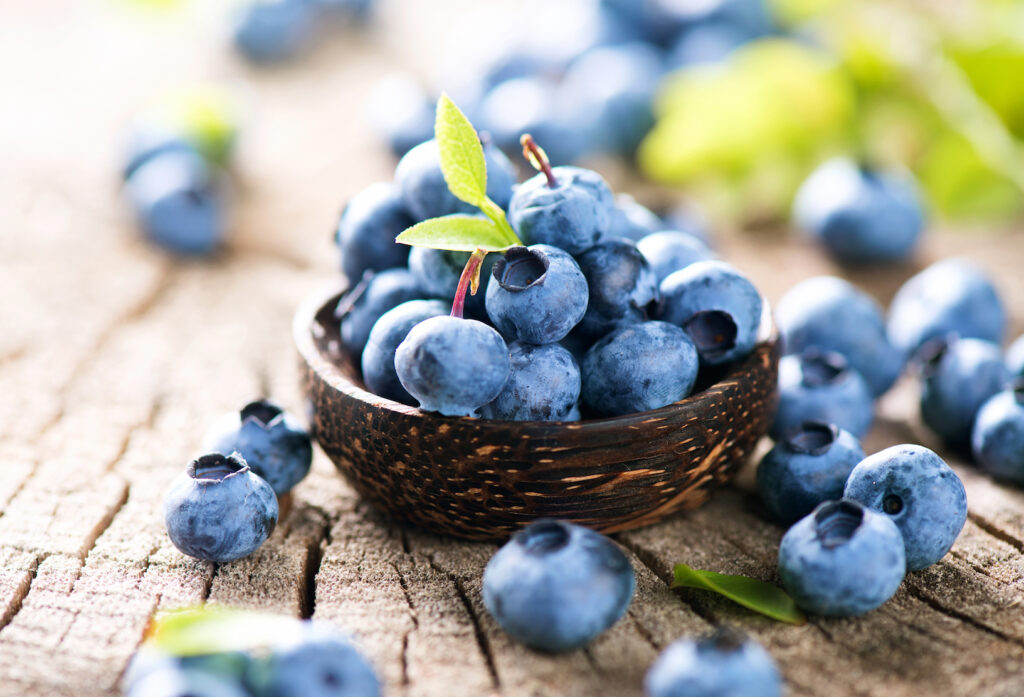
Having optimal health is important in any circumstance, but in a crisis situation, it could make all the difference. Being physically fit is one component of good health, but so is a healthy diet. While you are taking steps to store the affordable staples conducive to long-term storage, there are certain foods you should strive to eat regularly — and even more so if crisis strikes.
5 Superfoods for Your Preparations
Let’s take a look at 8 of the top expert-recommended “superfoods,” why they’re so healthy, and how you can integrate them into your food storage plan.
1. Blueberries
The dark blue hue of the blueberry is indicative of its superfood status. Its rich colour is caused by flavonoids, which are natural compounds that protect neurons in the brain and enhances both memory and cognitive function. Blueberries can be dehydrated and stored for up to a year or more if properly sealed and kept cool and dry. You might also consider growing them on your property — organic, wild blueberries pack the best superfood punch.
Also read: Plant and Defend: Basics of Defensive Plants
2. Eggs
Eggs provide some of the highest quality protein available. They also contain nine essential amino acids which are essential for the maintenance, repair and rebuilding of bodily tissues. These nutrients also offer immune system support and various key vitamins and hormones. Fresh, organic free-range eggs can be eaten raw without risk of salmonella. Consider keeping your own chickens and enjoy fresh eggs on a regular basis.
3. Kale
Kale and other leafy greens are beneficial to the stomach, liver, lungs, eyes and immune system. They are natural sources for vitamins A, B6, C, calcium, copper, manganese and potassium. Kale fuels metabolism, helps to lower cholesterol and fights infections, inflammation and cancer. It also strengthens bones and can prevent/reverse osteoporosis. Make kale chips in your dehydrator and store them vacuum-sealed; they could last for a decade or more. Kale is also easy to grow in the garden.
4. Probiotics
There’s been a lot of talk about probiotics lately, and for good reason. These naturally-occurring bacteria offer a variety of benefits including gut/stomach health, maintaining a healthy weight, and avoiding type 2 diabetes and mood disorders. While yogurt is the food most often associated with probiotics, they can also be acquired through a drink called kefir. Kefir contains essential amino acids, proteins, calcium, Vitamins B1, B2, B7, K and phosphorus. It is helpful to the kidneys, liver, skin and nervous system. Kefir can be home-made using milk or tibicos grains and a starter culture.
5. Nuts
Almonds and pistachios are excellent superfoods, but make sure you get raw organic; pasteurization zaps them of many of their nutrients. They can be dehydrated and stored to last for years. Nuts are rich in phytochemicals, which are plant components that help the heart and vascular health. They’re a great source for protein, fiber, calcium, vitamin E, magnesium, potassium, phosphorus and iron.
Enhanced Nutrition With Superfoods
While the staples of rice, beans and oats are the foundation of your long-term food storage plan, adding some of these superfoods can enhance nutrition for you and your family.
Nutrition is always important but in a time of crisis it’s so much more vital to have proper nutrition. In a world in which you may have to do more physical labour, you will need better fuel.
Post by John M.
Self-sufficiency and Preparedness solutions recommended for you:
Survival MD (Knowledge to survive any medical crisis situation)
The Lost Super Foods (126+ Survival Foods and Tips for Your Stockpile)
The Lost Ways (The vital self-sufficiency lessons our great grand-fathers left us)


